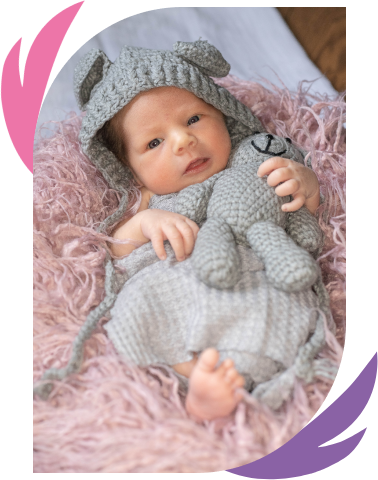
Egg donation and surrogacy at a glance
If a couple is unable to use their own genetic material (sperm and eggs), IVF surrogacy can be done using egg donation, donor sperm, or donor embryos from a donor.
A patient may decide to use egg donation for surrogacy if
- There are issues with their own eggs or sperm
- One or both partners have a genetic condition that can be transferred to the baby
- The woman is approaching menopause or
- The woman’s ovaries don’t produce viable eggs.
Although rare, a woman may not be able to carry a baby in her womb, and therefore, needs the services of a Gestational Surrogate
Donor sperm
There are two types of sperm donors: known donors and anonymous donors.
- Known Donor : If the donor is a known person, the sperm will be obtained, frozen, and stored for 6 months. The donor will undergo testing at the time of collection and after 6 months before the sperm is released in order to ensure that he doesn’t have any genetic diseases. The collected sample will be thawed and “prepared” before the IUI (artificial insemination), or IVF procedure takes place.
- Anonymous Donor : However, most couples get their donor sperm from a sperm bank, which is usually donated by anonymous donors. Men who are donating to sperm banks undergo comprehensive genetic and medical screening and are tested for communicable diseases. The collected sample is frozen and stored for 6 months, after which the donor is tested again for infectious diseases, like HIV. If the tests still come back negative, the sperm is then released and can be utilized for IUI or IVF. Fresh sperm and frozen sperm have approximately the same success rates.
Donor eggs
A young, fertile woman may donate eggs that a patient struggling with infertility can use in an assisted reproductive procedure, such as IVF. The eggs are “mixed” with the male partner’s or donor’s sperm, and the embryo(s) formed are placed in the womb of the patient.
Who should consider donor eggs?
A lot of women are unable to get pregnant with their own eggs, usually because of their advanced age. Ovarian function seems to reduce in women in their late thirties or early forties, causing a reduction in egg quality and quantity. Some women with cancer may undergo treatments that can affect the quantity and quality of their eggs. Other women may be suffering from severe genetic conditions that can be transmitted to the baby if they make use of their own eggs.
In these cases, egg-donor IVF may be the only safe option to conceive and give birth to a healthy, live baby. The fertility clinic will work together with their patients to select the right Egg Donor.
Egg donation is a time-taking and complicated procedure. Hence, women who are donating in the US get financial compensation for their effort, sacrifice, and time. The Egg Donor will need to take several ovarian stimulation drugs and complete an egg retrieval procedure.
The recipient also takes fertility medications to prepare her womb for implantation. After the eggs are collected, they are mixed with the male partner’s sperm, and the embryo(s) produced are placed in the recipient’s womb. While the IVF patient won’t be biologically related to the child, she will be able to carry the pregnancy and deliver the baby.
Things to keep in mind
Although egg donation is one excellent option to build a family, there are several emotional factors and costs that one needs to consider. The cost of the egg donation procedure – egg donor selection, medical and genetic screening, and treatment – all adds to the total IVF costs. While IVF can be expensive, it may offer infertile couples the best odds of having a healthy pregnancy, with the national live birth rate at 50%. Approximately 10% of all assisted reproductive treatments in the United States use donor eggs.
Using both donor eggs and donor sperm
At times, both the intended mother and father have infertility issues but still want to conceive and have their own children. In cases like these, both donor eggs and donor sperm are used. Couples with infertility may also decide to use frozen embryos for some IVF programs that permit patients who have completed their families to give out their unused embryos. Embryo donors need to be screened according to state and federal guidelines.
Using donated eggs, sperm, or embryos is a difficult decision because it means that the resulting baby will not share a genetic connection with both parents. Hence, it is important to speak with a mental health expert or a qualified counselor who is knowledgeable on this issue and can help you make your decision.
Additionally, if the couple is using a known donor, the physician may suggest that both parties go for counseling and talk to a lawyer. Fertility clinics usually advise that you seek an attorney’s assistance during the egg donation process, and it’s even required in some US states.
Gestational surrogacy
This is a surrogacy arrangement in which a 3rd party woman agrees to carry a pregnancy for the hopeful parents.
In gestational surrogacy, the eggs come from the intended mother or an Egg Donor, and sperm is obtained from the intended father or a sperm donor. The egg donation process is required for intended mothers who cannot use their own eggs for gestational surrogacy. The embryo(s) are placed into the womb of the Gestational Surrogate, who shares no genetic ties with the baby.
Although using a gestational carrier can be a stressful and challenging process, there are many reputable surrogacy agencies that can guide intended parents through each step of the way.
The live birth rates per embryo transfer are more than 60% when egg donation and gestational surrogacy are used. Couples usually have extra embryos that can be transferred later if the first cycle fails or if they want to make another baby in the future.
Conclusion
For Intended Parents unable to use their own eggs or sperms and carry a pregnancy, gestational surrogacy with donor eggs remains the best option to have a baby. Lucina Egg Bank has helped many hopeful couples find the perfect egg donor that resulted in a successful surrogacy outcome. Moreover, our available, top-quality frozen eggs reduce the wait time significantly.
If you are also seeking egg donation for your surrogacy process, search through our egg donor database or contact us today.















